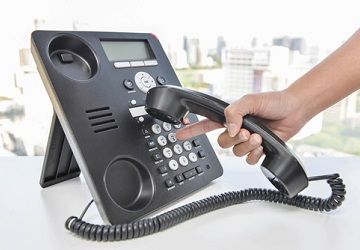Phone Etiquette Establishes the First Impression of Your Practice
Are patients turned off before they enter your practice? Make sure your staff is fully briefed on proper phone etiquette to keep patients calling for more bookings!

“You’re going in for a dental procedure, and the last thing you want is a group of unhappy people. You want the tone of voice to be warm, welcoming, professional and empathetic.” - Sharon Schweitzer
When the telephone rings in a dental practice, the goal should be to answer within two rings, and to sound professional and empathetic. But too often the importance of phone etiquette is overlooked, and that can leave callers, especially prospective patients, with a poor first impression of your practice.
How do prospective patients formulate their impression of your dental practice? It’s usually from an initial contact. And more often than not, that first contact occurs via a phone call.
But also more often than not, the importance of professional phone etiquette is overlooked.
Sharon Schweitzer, an international etiquette and modern manners expert, and founder of Access to Culture, says the initial phone call sets the tone for the first impression a caller has of your practice.
“If a potential patient calls for information about periodontics or other special procedure, and the person answering the phone is either unfamiliar with the procedure, doesn’t know the scope of the practice, or is not polite to the caller, that’s a sure way to lose that potential patient,” Schweitzer says.
ALL ABOUT TONE
Schweitzer says then when speaking on the phone, tone of voice sets the patient’s first impression of the practice. Is the tone warm and welcoming, or cold and dispassionate? It lets the caller know the type of culture that exists at the practice. What type of environment will they encounter when they come for their visit?
“You’re going in for a dental procedure, and the last thing you want is a group of unhappy people,” Schweitzer says. “You want the tone of voice to be warm, welcoming, professional and empathetic.”
Smiling helps. Schweitzer explains that the face has more muscles than any other part of the body. When you smile, neurotransmitters called endorphins are released. These endorphins make you feel happier and less stressed. So smiling not only enhances your physical appearance, it has an invisible impact as well.
And practice makes perfect.
“We make phone calls and have people practice answering the phone,” Schweitzer says. “We do a run through with some of the toughest questions they may receive. It really makes a big difference.”
ONE THING AT A TIME
Schweitzer says that, when answering the phone, it’s critical to give the caller your full attention. Millennials, she points out, are the generation of multitaskers, so resist the urge to type that concluding sentence on your post or scan a new email while speaking on the phone.
“Many times, especially when patients give you specific information, if you don’t listen and write it down, it can become a real problem,” she says. “Maybe it’s an allergy to latex, or penicillin, or a heart condition that requires some prophylactic. We recommend that when you answer the phone, you’re not doing anything else.”
What about putting a caller on hold? Schweitzer recommends asking permission first. Simply ask, “May I please put you on a brief hold?” And then check back within 30 seconds. A minute at the most. And if you need to keep them on hold, ask if it would be more convenient for them if you phoned them back.
“That person may have another appointment, or another call coming in,” Schweitzer says. “The practice may only have two or three lines rolling over, so it’s not a good idea to let the phone continue ringing.”
TRAINING AND POLITENESS
It can be easy to assume that most people today are technology savvy, but that’s not always the case. Someone new to the practice might not be technologically competent with your specific phone system. Do they know how to transfer a call, place a call on hold, or retrieve a voicemail message?
“Those are things that need to be done during the first few days on a new position,” Schweitzer says.
She recalls a training session she conducted for a group of judges in Texas. They wanted different ways for the receptionist to be able to say, “The judge is not here.” They didn’t want it to sound like the judge was on vacation.
“We came up with 25 different ways to tell the caller the judge was unavailable,” she says. “You can apply the same approach to a dental practice.”
In addition, she recommends that every phone conversation end with a graceful goodbye. That means thanking the caller for their time, for their interest, or for confirming an appointment. You can practice closings like, “It was a pleasure to speak with you. Let me know if I can answer any additional questions.” Invite them to call back if they need anything else.
“And then wait until the caller has hung up in case there’s another question,” Schweitzer says. “Unfortunately, not everybody does that these days.”
FOR MORE on bringing in new patients:
- How One Practice Successfully Implemented a Membership Plan
- Make Email an Important Part of Your Marketing Strategy
- Optimize Dentist's Chairside Time